Hey SeGuys and SeGals to another edition of the Mega Archive: the only place on the internet that still remembers the Sega Genesis/Mega Drive. Actually, that's not even remotely true, but if I keep on this obsequious path maybe Sega will send over some review copies of the half-dozen Like a Dragon games they're developing to your hardworking boy. Fingers crossed, yes? Regardless, we have another ten games that released across August and September, bringing us ever closer to the busy autumn season of Sega's 1993 release history. Next month's Mega Archive will be another Sega CD check in, as we bring that console closer to the end of its summer as well, so look forward to hearing more about some Japanese-only adventure games and RPGs I can barely read.
Turns out Sonic has a lot to answer for. I'm not just talking about bottoming out the ring economy by gathering them all together and subsequently losing them whenever he stubs his toe, or the extremely sorry state of the prodigious (emphasis on the "prod") internet slash-fiction community of works, but specifically the near-immediate "follow the leader" aftermath of his Sonic the Hedgehog 2 peak. Turns out a lot of people wanted in on his irreverent finger-wagging mascot platformer appeal, or perhaps more accurately speaking the boatload of money it made, and this entry of the Mega Archive typifies that like few others: we have no less than seven platformers featuring iconoclastic and/or anthropomorphic protagonists running around annoying maze-like levels for their own ends. For the most part the Mega Drive has resisted trends and waves: they had a lot of shoot 'em ups to begin with and certainly a lot of sports games since (mostly the fault of one voltaic company in particular) but we'd usually get more of a mix of genres than this in any given batch of ten. I guess we better ride this out until Awesome Possum arrives and humbles the rest of the mascot platformer competition so badly that it dries up.
Speaking of humbling, please feel free to peruse the Master List (or Master Spreadsheet, I guess) of the Mega Archive to see how far we've come and how far we've yet to go. I'm just about done adding the last of the 1993 games; as you can tell, it'll probably take another year of the Mega Archive just to reach the end of December '93. Now that truly is humbling.
Part XXXVI: 461-470 (August '93 - September '93)
461: TechnoClash
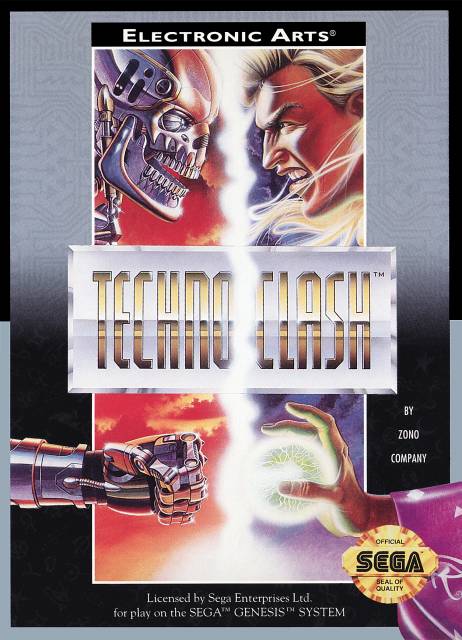
- Developer: Zono / BlueSky Software
- Publisher: Electronic Arts
- JP Release: N/A
- NA Release: August 1993
- EU Release: August 1993
- Franchise: N/A
- Genre: Action-Adventure
- Theme: Technology vs. Magic
- Premise: Fantasy clashes with the modern world in this thematic crossover that's a bit like Gauntlet but even tougher to survive. Wizard needs a takeout drone delivery badly.
- Availability: Nope. It's a neat concept that could use a second chance though.
- Preservation: Most of the bad games that filter through the Mega Archive tend to be wholly unoriginal (usually licensed), so cases like TechnoClash stand out even with its faults. You play a wizard who enters a crapshoot sci-fi version of our world in order to fight cyborgs before they can invade and disrupt your harmonious land with all their evil technologies like the printing press, heart medicine, or flushing toilets. Various places call this an RPG but it's really more like Gauntlet: a top-down action free-for-all with tons of enemies that run up to you in every direction, making it almost impossible to avoid getting hit. However, unlike Gauntlet, you don't starve to death if you take more than five minutes to rest so you can very gradually work your way through the hordes to your objectives. It also has a proto-Mark of Kri thing where you can scout the land with your bird pal. It's not entirely clear who the developers are: Zono is credited on the box for the NA version of the game while BlueSky has a management credit in the in-game staff roll. It's probably both? Let's say both. BlueSky we've met several times before (in fact, we ended the last Mega Archive on their Jurassic Park adaptation) but Zono's new. Another Californian studio, Zono supposedly worked on Sega's Joe Montana Football (the first one, which required many contractors to finish in time) but this is their only confirmed MD credit. They would become more famous for the ossified Saturn classic that is Mr. Bones.
- Wiki Notes: Just some bits and pieces like a new header image, a EU release, and some overview text.
462: Wayne's World
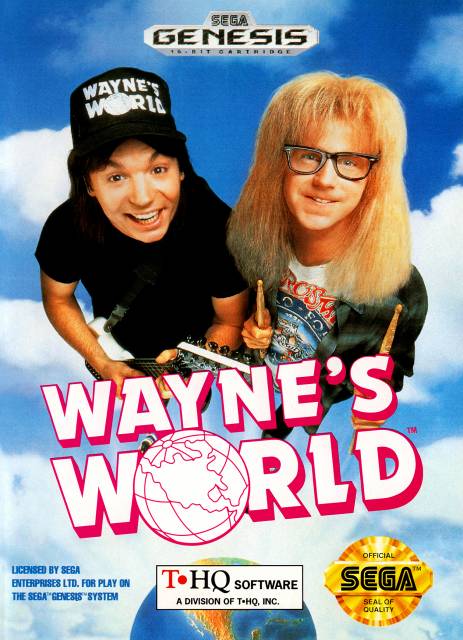
- Developer: Gray Matter
- Publisher: THQ
- JP Release: N/A
- NA Release: August 1993
- EU Release: N/A
- Franchise: Wayne's World
- Genre: Platformer
- Theme: This Game Blows Goats, I Have Proof
- Premise: Garth is kidnapped by a purple blob so Wayne goes to rescue him. Look, you try to come up with a video game premise for this license in the five minutes THQ allows you.
- Availability: Mercifully out of print.
- Preservation: Most of the bad games that filter through the Mega Archive tend to be wholly unoriginal (usually licensed), so cases like Wayne's World don't stand out at all because it's exactly that. While the SNL Myers movie it's based on still holds up today as a surreal comedy classic, much less can be said about the video game tie-in. Rather than clashing with his unctuous PR "pralines and dick" agent Benjamin or jamming out with his cool bass guitarist girlfriend Cassandra, Wayne's left to fight weird monsters (and occasionally robot Elvises) in a game-within-a-game that has nothing to do with anything. It's truly terrible, and I almost wish they built a game around that one scene where they play hockey out in the middle of the street instead: at least the Mega Drive has a decent track history with that sport. Gray Matter are our developers here, a team we last saw in the previous Mega Archive with B.O.B., a game I'm sure they were a lot more invested in. Look forward to many more thrown-together licensed beauties from THQ in upcoming entries.
- Wiki Notes: SNES double-dip. Just some screenshots and an edited release.
463: Rocket Knight Adventures
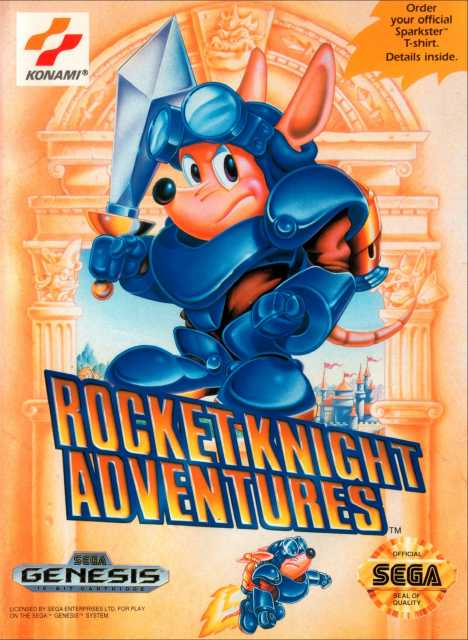
- Developer: Konami
- Publisher: Konami
- JP Release: 1993-08-06
- NA Release: August 1993
- EU Release: September 1993
- Franchise: Rocket Knight Adventures
- Genre: Jet-Powered Platformer
- Theme: Armored rodents
- Premise: Sparkster is one of the titular Rocket Knights: an elite squad handpicked by the king of Zebulos to safeguard a starship once used to attack the planet. The traitorous former Rocket Knight Axel Gear and the rival porcine kingdom of Devotindos threaten the peace of Zebulos once again.
- Availability: It's Konami, so good luck to those hoping for a rerelease. The franchise did get rebooted by Climax Group in 2010, and that version is on Steam as well as some older consoles.
- Preservation: Finally, our first good game this entry is the classic Konami platformer Rocket Knight Adventures. Taking the idea of an alacritous rodent protagonist in a slightly different direction than Sonic, Rocket Knight Adventures has its chivalrous hero Sparkster get everywhere via a jetpack that allows him to bounce off surfaces diagonally, as well as hook onto parts of the level with his prehensile tail. It's a little tough to get used to the game's rapid traversal but the sense of speed once you're tuned into its wavelength makes for some great, fast-paced fun. Rocket Knight Adventures wouldn't remain a Sega exclusive mascot platformer franchise for long—it was followed by a SNES-only spin-off, as well as a direct Mega Drive sequel—but Sparkster is one of the few others on the system to give Sonic a good run for his rings.
- Wiki Notes: All good here, barely had to change a thing.
464: Socket / Time Dominator 1st
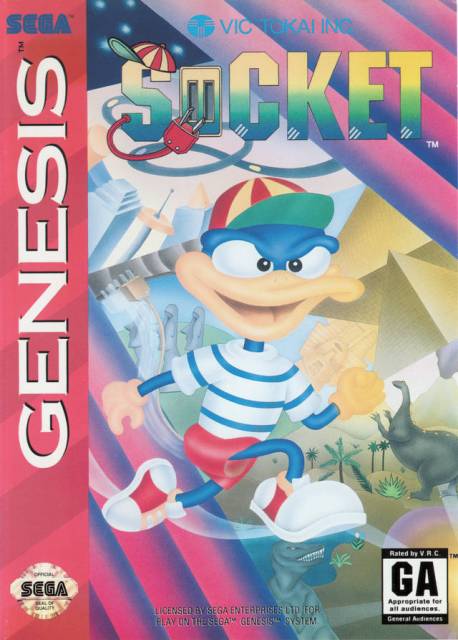
- Developer: Vic Tokai
- Publisher: Vic Tokai
- JP Release: 1994-03-25 (as Time Dominator 1st)
- NA Release: 1993-08-17 (as Socket)
- EU Release: N/A
- Franchise: N/A
- Genre: Platformer
- Theme: Sonic Sold Pretty Well, Huh?
- Premise: Socket is a time-travelling duck robot (with an attitude!) that is hired to defeat the Time Dominator, a villain that dominates time.
- Availability: Nope. But now feels like a more permissive era for 16-bit Sonic clones if the likes of Freedom Planet et al are any indication, so maybe Socket was just ahead of its time? (Time travel jokes.)
- Preservation: Neither the best nor the worst of the mascot platformer rush this month but certainly the most shameless. The Vic Tokai development team tapped into the depths of their collective creativity, found bupkis, and decided to make Sonic the Hedgehog but with a duck that needed to constantly feed itself electricity to stay alive like a proto-Crank 2. Socket is like if a Tesla was anthropomorphized as a hopeless edgelord who thought he was funnier and cooler than he actually was. Wait, that's just Elon Musk. Anyway, suffice it to say, critics at the time didn't care too much for Socket's flagrant ripping off of the system's best and brightest star but impressions have softened a bit since then, as it's now retroactively evident that Vic Tokai had a better idea for a Sonic sequel than most of Sonic Team did. (This is the fourth of five Vic Tokai-developed games for the Mega Drive. The fifth and last is a doozy we'll be seeing come December '93.)
- Wiki Notes: Pretty barren page, looks like everyone's forgotten about ol' Socket. Usual mix of screenshots, releases, and text.
465: The Adventures of Rocky and Bullwinkle and Friends

- Developer: Imagineering
- Publisher: Absolute Entertainment
- JP Release: N/A
- NA Release: September 1993
- EU Release: N/A
- Franchise: Rocky and Bullwinkle
- Genre: Platformer
- Theme: Only the Hottest 1960s Properties for Today's Youths
- Premise: Rocky the Flying Squirrel and Bullwinkle the Moose are recruited to recover some stolen museum artifacts, leading them on a trip around the world. Guessing it was probably those damn Russians again. Maybe avoid getting in any planes or going near any windows, you two (though I guess as a flying squirrel Rocky will be fine in either case).
- Availability: Nah. I think Rocky and Bullwinkle have even less of a cultural cachet now. Fun fact though: The distance in time between the Rocky and Bullwinkle TV show ending in 1964 and this game coming out is shorter than the distance between this game's release and now. Ain't time messed up?
- Preservation: The handlers of boomer cartoon duo Rocky and Bullwinkle attempted to draw in a new generation of kid viewers with this 16-bit video game adaptation based on a slightly earlier 8-bit one, though sadly didn't follow through with the second half of the plan which was to make the game good enough that the kids would want to see more of the characters, or indeed be left with any sort of positive impression towards the franchise. A mistake that would eventually be repeated with that De Niro movie. It's one of those "variety" platformer-action games that's just a rough assemblage of ideas the designers had for the license, loosely tied together by some story about a museum heist. The "Friends" of the title in this case refer to unflappable Canadian mountie Dudley Do-Right and the time-travelling duo of Sherman and Mr. Peabody, all of whom appear in interstitial mini-games. We last met the gruesome twosome of Imagineering and Absolute with the regrettable Toys [MA XXXIII] so it would be extremely generous to say that they are at least improving a little. I can't tell you how many times I've been tripped up by there being an Imagineering and an Imagineer out there: the latter is a Japanese publisher that happily for the sake of clarity we won't be encountering on the Mega Archive (though they were behind a lot of Saturn games) but I still do a double take each time.
- Wiki Notes: SNES double-dip. Nothing new to add.
466: Chuck Rock II: Son of Chuck
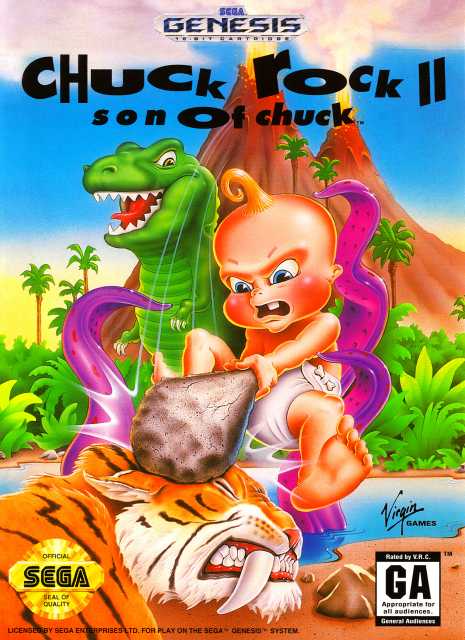
- Developer: Core Design
- Publisher: Core Design (EU) / Virgin Interactive (NA/JP)
- JP Release: 1994-06-24
- NA Release: September 1993
- EU Release: October 1993
- Franchise: Chuck Rock
- Genre: Platformer
- Theme: Exploitation of Child Labor
- Premise: Chuck Rock and his recently rescued wife Ophelia have been kidnapped by unscrupulous car manufacturer Brick Jagger (why is Mick Jagger's ancestor making stone cars?), leaving their baby son abandoned at home. Will Chuck Jr. choose the toy and die with his family, or choose the weapon and fight for vengeance?
- Availability: Nah. The Chuck Rock franchise only saw one more game after this, Core Design having then moved onto bigger and boobier things.
- Preservation: Mascotageddon continues with this prehistoric platformer sequel from UK developers Core Design. Like the first, it's a comically silly platformer with many exaggerated expressions as the new baby protagonist cuts a bloody swathe through some anachronistic dinosaur foes. I don't know what it is about prehistoric babies but it felt like they were all over the place in the early '90s, from Hudson's Bonk series to that Dinosaurs TV show with its Urkel-esque catchphrase-generating crotch goblin. Strike while the baby iron's hot, I guess they (never) say. It's more or less the same game but with a few control tweaks and some extra mini-game challenges. It's also visually a little sharper: buffing what was already a highlight in the first game. We're still very much in Amiga platformer territory so caveat emptor, but at least this is one of the better ones.
- Wiki Notes: Unlike the first Chuck Rock this sequel was never ported to the SNES, maybe because it already had Super Bonk and there was some kind of very stupid cavebaby arms race happening. That meant no double-dipping and so the page needed a bit of everything including two releases, a header, and some body text.
467: Dashin' Desperadoes
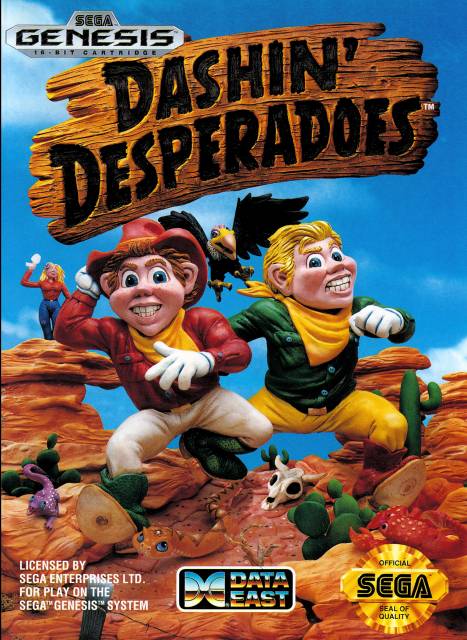
- Developer: Data East
- Publisher: Data East
- JP Release: N/A
- NA Release: September 1993
- EU Release: N/A
- Franchise: N/A
- Genre: Racing / Platformer
- Theme: Vageuly Western
- Premise: The girl you like is willing to date you, but only if you can outrun this other dude. A racing game where "NTR" isn't short for "nitrous".
- Availability: Nope. Unlike a lot of Data East games, this one has yet to resurface.
- Preservation: I could've sworn this was an Amiga platformer just looking at the artwork, but it's our old pals Data East again. DE plays against type here to develop this competitive two-player racer exclusively for the Genesis (and only in America, no less): a departure from what had so far been a string of arcade game conversions. While the game can be played in single-player, it's built for two: evinced by the permanent split-screen which makes it tough to register anything above or below you, and given it's a platformer on top of being a racing game that lack of vertical perspective is troubling. It scores points for originality though: it's like if someone saw Sonic 2 and wondered why there wasn't a mode to let Sonic and Tails race each other to the end of the zone. Oh wait, Sonic 2 did have that mode. OK, so I guess it's not that original but then you never saw Tails wearing a Stetson, did you?
- Wiki Notes: A release, a header, and a bit of text.
468: A Dinosaur's Tale
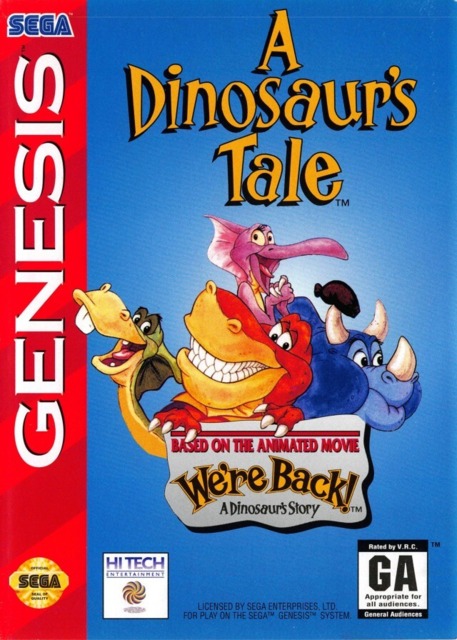
- Developer: Funcom
- Publisher: Hi-Tech Expressions
- JP Release: N/A
- NA Release: September 1993
- EU Release: N/A
- Franchise: We're Back! A Dinosaur's Story
- Genre: Platformer
- Theme: !Dinosaurs, Mi Amigos¡
- Premise: A 1993 movie where dinosaurs are brought back in the modern day. But not that one.
- Availability: Licensed game for a movie no-one saw. They ain't coming back.
- Preservation: I have to admit to having zero nostalgia for We're Back!. It somehow completely skipped me by, unlike the first "Amblimation" (take it from me, Mr. Portmento himself; that's a bad one) feature An American Tail: Fievel Goes West. Based on a kids' book of the same name, the game and movie both are about a Professor Neweyes fighting his brother Screweyes over the ownership of a bunch of dinosaurs the former kidnapped and sapience'd up by having them eat brain cereal. I guess the idea of this franchise was to counterprogram the less kid-friendly Jurassic Park (which was also Spielberg and Amblin, so they're counterprogramming themselves?) but it backfired when all the kids still flocked to the live-action movie like so many Compsognathus. Also, We're Back! is not that much more kid-friendly: the bad guy gets graphically eaten by crows at the end (spoilers?). Anyway, the Genesis game—which doesn't even have the right title—is the usual licensed dreck, notable only for being a completely different flavor of licensed dreck than the SNES game. It actually plays a lot like Disney's Aladdin, which also had distinct SNES and Genesis adaptations. I guess that fits Amblin's own aspirations to try to out-Disney Disney. Didn't really pan out for them. Also, this is Funcom's first Genesis game; we'll be seeing this Nordic studio a few more times in Mega Archive entries to come, including (funnily enough) a Disney tie-in.
- Wiki Notes: The great dilemma with some licensed games like A Dinosaur's Tale is whether to stick all the versions on one page or separate them out. What was often the case back then was that the license holders recruited multiple development teams to work on separate games for different systems, creating enough distinction between them all that they probably shouldn't be lumped together (though in most cases they currently still are). This is especially true of Game Boy games, which necessarily have to downscale a bit. Since the Dinosaur Story/Tale SNES/MD games have different names and had separate pages already I've kept it that way but I've still no idea if that's the right course.
469: NHL '94

- Developer: High Score Productions
- Publisher: Electronic Arts
- JP Release: N/A
- NA Release: September 1993
- EU Release: 1993-09-11
- Franchise: NHL Hockey
- Genre: Hockey
- Theme: Hockey
- Premise: Hockey
- Availability: NHL '24 is literally out this week, as of writing. It'll have different hockey guys but it'll probably be better. Actually, it probably won't, but it'll be commercially available at least.
- Preservation: I've made it abundantly clear by now that I am by no means a sports games guy but even I have to admit to having some good times with NHL 94 back in its time. We're right at the peak of EA Sports and its ability to mesh a simulation-heavy experience with many options to peruse with a very accessible core that anyone could jump into, regardless of their familiarity with the sport. NHL 94 sees EA once again procure the licenses to use both team and player names (the previous year's, NHLPA '93, was just the player's association license) and the franchise would continue to become a pillar of the Genesis fall schedule deep into the late '90s. I don't really see it myself, but NHL 94 is one of those games that is often the answer to "what is the best Genesis game?". The only real downside here is that the spoilsports at the NHL demanded Sega and EA take all the fighting out (it came back for NHL 96). The big question I always have about this sport is that we have dirt hockey, ice hockey, and air hockey so where the heck is fire hockey? I want to sling flaming pucks at peoples' faces, so make this happen already EA.
- Wiki Notes: A double-dip for a popular game means an already thorough wiki page. Just had to tinker with releases a little. For some reason there are sites that suggest March was the release month, even though every NHL game before and since came out around September when the real NHL ice hockey season starts.
470: Street Fighter II': Special Champion Edition / Street Fighter II' Plus
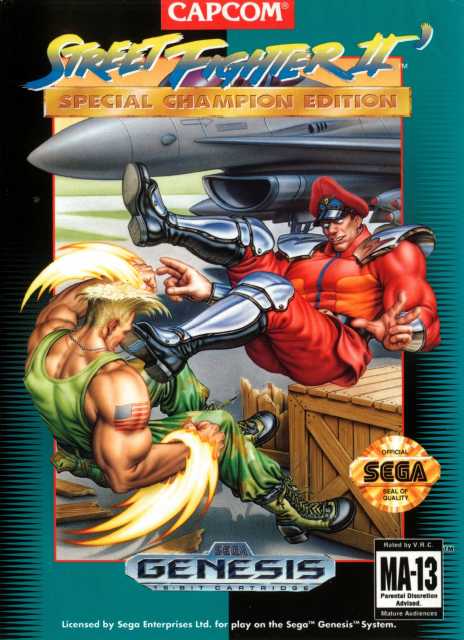
- Developer: Capcom
- Publisher: Capcom (NA/JP) / Sega (EU)
- JP Release: 1993-09-28
- NA Release: September 1993
- EU Release: 1993-10-29
- Franchise: Street Fighter
- Genre: Fighter, Street
- Theme: Guile's
- Premise: When travelling the world it's important to explore the local cultures, sample the local cuisines, and beat up the local brawlers. And also have an announcer guy with you to yell out the name of the country when the plane touches down.
- Availability: If you just want to play some dang ol' Street Fighter there are plenty of options. Might I suggest SF6?
- Preservation: I'm not going to talk about what Street Fighter II is, everyone already knows. Instead, I'll talk about Street Fighter II on Mega Drive. Wild as it is to believe, but this "extra bells 'n' whistles" edition of everyone's public disturbance simulator was actually the first SF game to be released on any Sega console, not just the MD. Legend has it that Sega delayed the original MD port Capcom was working on, which would've been for the standard Champion Edition (that's the second of five SF2s, for anyone not following), to incorporate all the SF2 Turbo (that's the third one) additions so they could compete with the SNES port of that same iteration. Sega were keenly aware back then that if you just waited a few months a better version of SF2 would inevitably show up. (Speaking of which, in about nine months we're going to see Super Street Fighter II make its way onto the Mega Drive too. Blink with this franchise, and you'll be two versions behind wondering where this Bruce Lee clone came from.) On another surprising note, this is actually the first MD game Capcom developed themselves; there'd been many Capcom arcade games ported over but those were all done by Sega internally.
- Wiki Notes: Due to the weird history of Street Fighter II on consoles, this was a double-dip but not a SNES one. Rather, it's for the more-than-just-slightly scuffed Japan-exclusive PC Engine version that only saw an international release when it reappeared on Wii VC some fifteen years later. Woe betide anyone buying that thinking it was the arcade original.
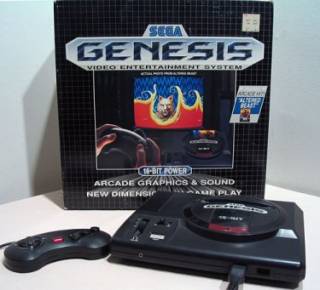
Log in to comment